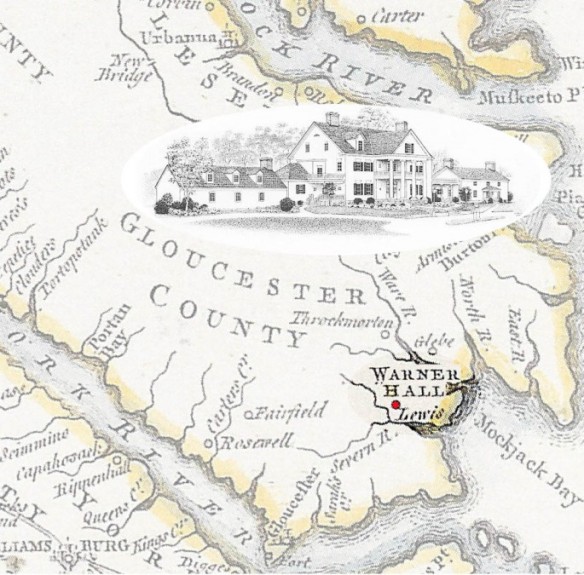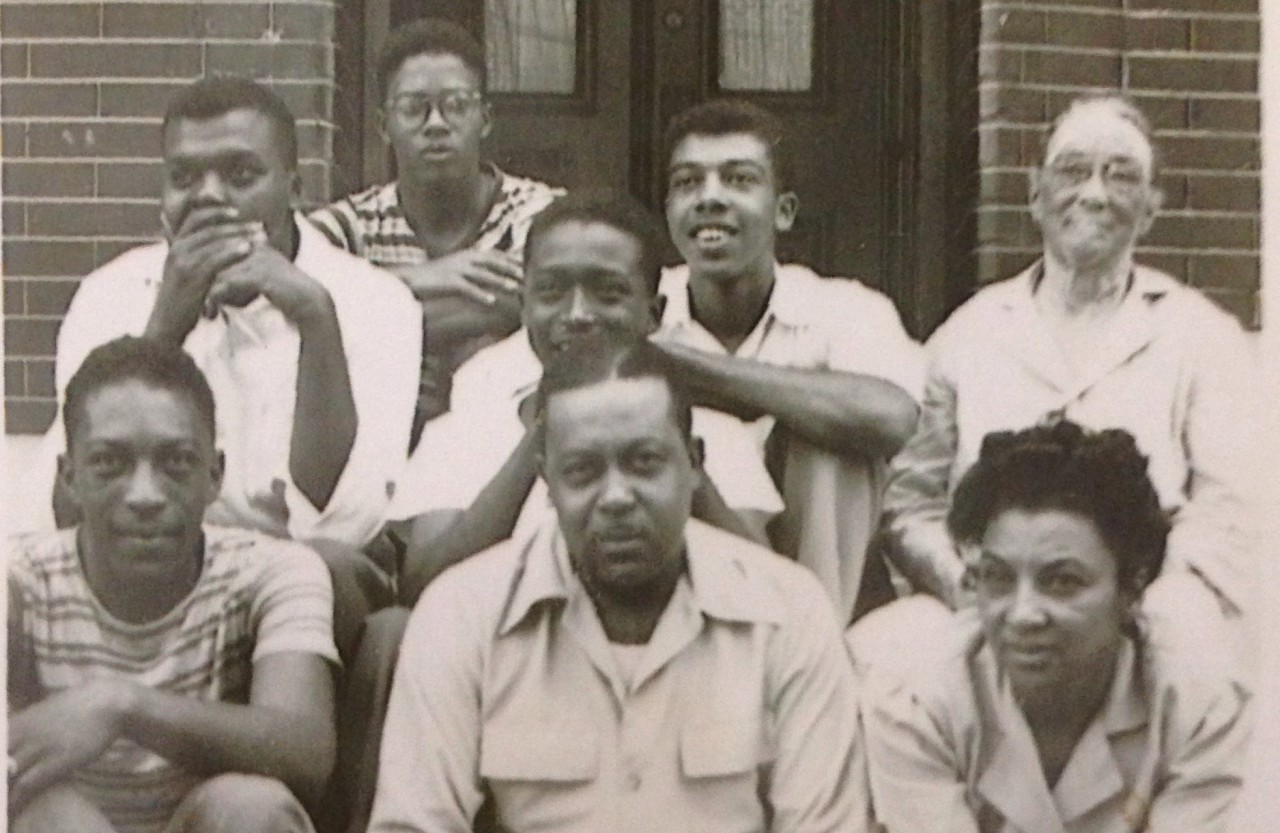
Gloucester County,Virginia, showing the locations of property owned by the Lewis family, among others.
Mildred Stanley was our neighbor when we lived in Raleigh. She had snow white hair and looked to be in her seventies. Mrs. Stanley spoke with a beautiful Southern accent and stood in as a sort of grandmother when my kids were little. Most importantly, she was gracious and kind and showed no trace of racism. She was a White Southerner with whom I could speak freely.
Originally, I felt no connection to the State of Virginia. My relatives lived in North Carolina. We drove through VA to get to NC. The typical comment was, ” It took us four hours to get to Richmond. That’s pretty good time, about halfway to Rocky Mount”. Sometimes, my grandmother would stop for ice cream in Virginia.
I met Mildred during the years when I had an interest in genealogy, but there were few online sources available to do research. I had two small children and commitments at church and school. My ideas about family history were vague. My relatives, were not talking, so I talked to Mildred.
While I don’t remember details, I learned that Mildred was from a longstanding Virginia family. They probably owned slaves and were socially genteel. Mildred’s mother was a DAR member, but she had not joined. Mildred encouraged me to research and possibly apply for DAR membership. In general terms, she told me that Virginians saw themselves as different, above other Americans, because of their unique history. Virginia had given the United States early historical figures such as George Washington, Thomas Jefferson and James Madison. There was also the matter of Robert E. Lee, but we didn’t dwell on him. Mildred gave me a new view on Southern History.
I also spoke with some of the older ladies at church, asking about their perspective on the Civil War. They tended to see the War as a time when their families lost land, property and prestige. Under direct questioning, the ladies admitted that their families owned slaves, but, they still should not have lost the family silver. I did not pursue an argument, because I wanted their perspective.
Online genealogy took a great leap forward when Ancestry started digitizing Census records around 2002. As the records became available, I was able to discover and document my paternal family. As a child, I had regular contact with my mother’s relatives in Baltimore. That contact stopped when my grandmother and mother died. I got totally absorbed into my paternal family and lost contact with all my maternal relatives.
Initially, the only vital record I had for my mother was a Death Certificate. I requested a Birth Certificate from Baltimore and got a reply that no such record existed! I realized that I knew only assumptions about my mother, and few actual facts. Talking to other people did not help. I spoke to one person, now deceased, who made it clear that she would not tell me anything about my mother.
In 2002, the 1920 and 1930 Census records became available online. My initial searches were for my maternal grandmother, whom I found, in Virginia. I then found my mother, listed in the 1930 Census, also in Virginia. I never knew about a Virginia connection. My grandmother’s surname was, Gayle, which I took to be the name of a slave-owning family in the area. Oddly enough, there were few White Gayles in the area. There were some Gayles in nearby counties, but no evidence to suggest any close connection. Later DNA testing has not linked me to the Gayle family. For now, my Gayle line is a dead-end.
More recently, I found a newspaper obituary for my great-grandmother, which gave me her maiden name, which was Lewis. That name led me to find records that listed her parents as Henry Lewis and Harriet Allmond. (I will be looking at the Allmond surname in the near future.)
Henry Lewis was likely born enslaved and freed after the Civil War. I have been able to document his ancestry back two generations, to Adam and Daphne Lewis whose estimated lifespans were from about 1765-1870. The Lewis family lived in the Middle Peninsula of Virginia, which includes Essex, Gloucester, King and Queen, King William, Mathews, and Middlesex counties. The area is bordered by the York River and the Chesapeake Bay.
Since I found no additional records on Adam and Daphne Lewis, I started to look at the slave-owning families in that part of Virginia. I found the Lewis family of Warner Hall and the Washington Family had property in the area. I also checked Census records and Voter/Tax Rolls. There were men from the Lewis family in Gloucester County at the time when Adam Lewis was conceived. It is also possible that one of Adam’s (or Daphne’s) ancestors had a White, Lewis parent. The end result is that more than 200 years later, my DNA matches that of at least 3 people who are descendants of the Lewis and Washington families of Gloucester, VA. That information is the best indication I can get that my ancestors lived in that area from colonial times to the 20th Century. The courthouse records for Gloucester were burned during the Civil War, so a great deal of information has been lost. Perhaps one day I can get information about the enslaved people in the area, but I do not expect to get voluntary information from the White descendants of theses families. My experience with them has been as follows:
When I first got my DNA test results back from Ancestry, I uploaded them to FTDNA and GedMatch. On each of the websites, I saw the same group of matches that I could not identify. At the time, I was focused on the paternal side of my family, where I knew enough history make good guesses. During this time, I also used my photograph as a profile picture, but hid my ethnic breakdown. I had my photo up for about two years. During that time, I got contacted by African-American matches and only one or two White matches. In one notable case, a White woman blocked me from her matches (and a DNA Circle) once she discovered our common ancestry. I was clear that she hated the idea of having Black kin. My check for this was the fact that Aunt Jackie was also a match for the same woman. Since I never posted a photo for Jackie, the match never knew her ethnicity and kept her as a match and in her DNA circle. Of course, Jackie and I have the same direct link to this woman’s family.
Based on my bad experience with this woman, I removed my photograph and replaced it with a generic image. Within a day or two of the change, I got a message from the administrator of the Lewis/Washington matches, asking about my ancestry and suggesting possible ancestors that he found interesting. I gave him what help I could and have not heard from him again. I was important to me that he accepted my match as valid. That corroborates my sense of common ancestry with the Lewis and Washington families. This contradicts the idea that Lewis was simply a”slave” name. For my ancestors, this seems to be a recurring pattern. Their surnames often give clues to their ancestry, as much as being adopted names.
n

Please contact me, I believe Adam and Daphne were my 4th great grandparents.
LikeLike